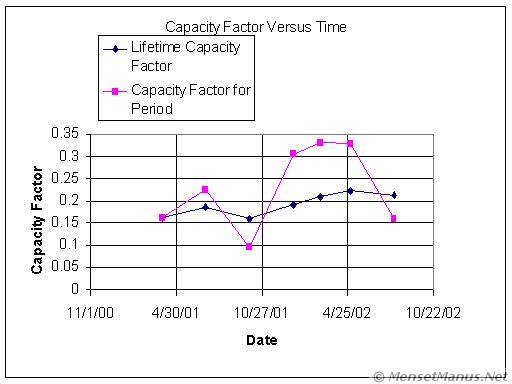
TVA has finally released more wind energy production data. The plot and table below provide a summary of the historical performance.
Could it be possible that TVA would adjust their reporting of the wind power plant's energy production data to make it look better than it would look with objective reporting? Could it be possible that TVA would call a facility "green" and good for the environment regardless of the possible consequences of an accident at the facility? It appears that the answer to both questions is "yes."
One thing that stands out in the latest data is the energy production milestone that was finally reached. The plant has finally produced over 6 million kilowatt-hours. It only took about 19 to 21 months to produce the amount of energy that TVA originally said (and still displays on some web pages) they would produce each year. [Update August 21, 2004: TVA's web sites now say 4.6 million kwh/year, but still said 6 million as of late 2003.]
In 2001, TVA reported wind energy production data for periods ending at the end of March, June, September, and December. Although the reporting was delayed significantly each time, at least they followed a conventional, regular, quarterly pattern. In 2002, TVA has used an irregular pattern of reporting by giving data for periods ending at the end of February (2 months), April (2 months), and now July (3 months). As usual, the reporting was delayed each time.
What does this irregular and infrequent reporting accomplish? For one thing, we have very few data points. After one more month, the windmills will have been operating for over 24 months, but we have only 7 data points. In addition, we can't make good year-to-year comparisons of energy production, because we don't have comparable data. Another thing this irregular reporting accomplishes is to mask or minimize the appearance of large fluctuations in production. If you report every two months during windy months, but only every 3 months during slack months, the numbers don't look as drastically different to the casual observer.
Another thing that is NEVER seen with this infrequent reporting is how often, and for how long at a time, the plant produces essentially zero power. I have a small windmill in my front yard, and it often sits still for minutes or hours, or occasionally for days, at a time. The wind on Buffalo Mountain is surely more dependable, but from watching the weather data (scroll down for graphs), I know that even there the wind can remain fairly low for days in a row. By only reporting every two or three months, TVA doesn't let us see how bad these "dry" periods can be.
Of course it would be more relevant to examine the economics of the wind power plant, but TVA doesn't seem to publicize that data at all.